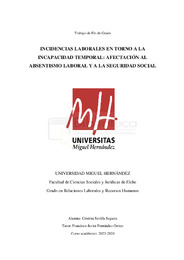Please use this identifier to cite or link to this item:
https://hdl.handle.net/11000/33238Incidencias laborales en torno a la incapacidad temporal: afectación al absentismo laboral y a la seguridad social
| Title: Incidencias laborales en torno a la incapacidad temporal: afectación al absentismo laboral y a la seguridad social |
| Authors: Sevilla Segarra, Cristina |
| Tutor: Fernández Orrico, Fco. Javier |
| Editor: Universidad Miguel Hernández de Elche |
| Department: Departamentos de la UMH::Ciencia Jurídica |
| Issue Date: 2024-06 |
| URI: https://hdl.handle.net/11000/33238 |
| Abstract: La incapacidad temporal es la situación en la que se encuentra un trabajador cuando está imposibilidado temporalmente para trabajar debido a una enfermedad o lesión. Durante este periodo de tiempo, siempre que haya generado el derecho, recibe un subsidio diario que cubre la situación de necesidad que se da por la pérdida de rentas del trabajador hasta que se recupere y pueda regresar al trabajo. La importancia de este tema se manifiesta tanto en el ámbito laboral como en el de seguridad social porque es muy probable que todas las personas trabajadoras tengan que hacer frente a esta situación en algún momento de su vida laboral. Por este motivo, el objetivo principal de este trabajo ha sido entender el impacto de la incapacidad temporal, analizando qué ocurre cuando estando en situación de incapacidad temporal, concurren otras contingencias laborales, como el desempleo o la incapacidad permanente. Se investigará cómo se gestiona legislativamente estas diferentes situaciones, evaluando si las medidas actuales son adecuadas para prevenir el fraude sin comprometer la protección de los trabajadores, lo cual constituye un equilibrio difícil de alcanzar. También se analizarán los retos a los que se enfrentan las personas trabajadoras en dicha situación. Por otro lado, se estudia el marco teórico y normativo de referencia de la IT, teniendo en cuenta las diferentes modificaciones legislativas que ha sufrido esta prestación con el propósito de evitar un uso fraudulento de esta situación, cuáles han sido sus resultados y los datos actuales, pues estas situaciones influyen significativamente en el absentismo laboral al que tienen que hacer frente las empresas. La metodologia utilizada ha sido jurídica. Este estudio se ha basado en realizar una investigación bibliográfica centrada en el ámbito de la incapacidad temporal, combinando interpretaciones doctrinales y jurisprudenciales y, por otro lado, en el estudio del coste que ésta tiene para la Seguridad Social. Tras el análisis de la regulación legislativa de la incapacidad temporal se ha podido constatar que ha generado más interés evitar el fraude que velar por la protección de las personas trabajadoras que sí están haciendo un uso adecuado de la prestación, que además necesitan para compensar la pérdida de ingresos y cubrir sus necesidades básicas durante este periodo. Temporary incapacity is the situation in which a worker finds themselves when they are temporarily unable to perform their job due to illness or injury. During this time, provided that they have accrued the right, they receive economic benefits until they recover and can return to work. This is a matter of utmost importance both in the workplace and in social security because practically all working individuals will face this situation at some point in their working lives. For this reason, the main objective of this work has been to understand the impact of temporary incapacity, analyzing what happens when other employment contingencies, such as unemployment or permanent disability, coincide while being in a situation of temporary incapacity. We will investigate how these different situations are legislatively managed, evaluating whether current measures are adequate to prevent fraud without compromising the protection of workers, which constitutes a difficult balance to achieve. We will also analyze the challenges that working individuals face in such situations. On the other hand, the theoretical and normative framework of reference for temporary incapacity is studied, taking into account the various legislative modifications that this benefit has undergone with the purpose of preventing fraudulent use of this situation, what have been its results, and the current data, as these situations significantly influence the work absenteeism that companies have to face. The methodology used has been legal. This study has been based on conducting bibliographic research focused on the field of temporary incapacity, combining doctrinal and jurisprudential interpretations, and, on the other hand, on studying the cost that it represents for Social Security. After analyzing the legislative regulation of temporary incapacity, it has been found that there has been more interest in preventing fraud than in ensuring the protection of working individuals who are legitimately using the benefit. These individuals need it to compensate for income loss and cover their basic needs during this period. |
| Keywords/Subjects: incapacidad temporal seguridad social absentismo laboral contingencias legislación temporary incapacity social security work absenteeism contingencies ligislation |
| Knowledge area: CDU: Ciencias aplicadas: Gestión y organización. Administración y dirección de empresas. Publicidad. Relaciones públicas. Medios de comunicación de masas |
| Type of document: info:eu-repo/semantics/bachelorThesis |
| Access rights: info:eu-repo/semantics/openAccess Attribution-NonCommercial-NoDerivatives 4.0 Internacional |
| Appears in Collections: TFG - Relaciones Laborales y Recursos Humanos |
.png)

